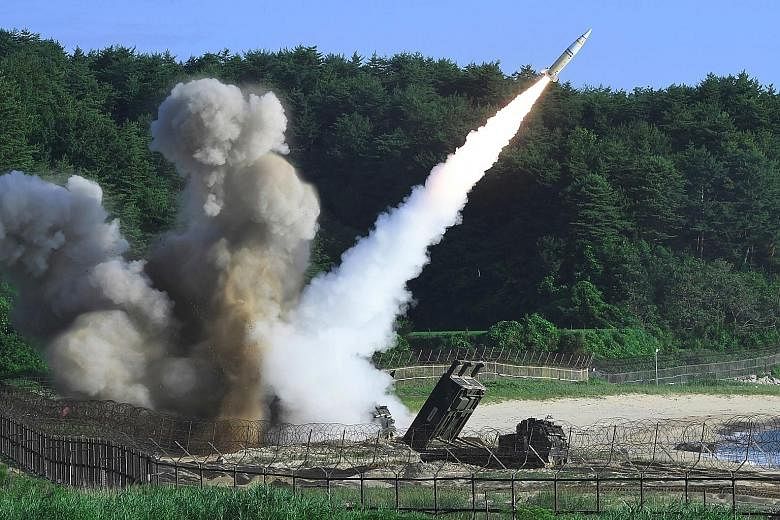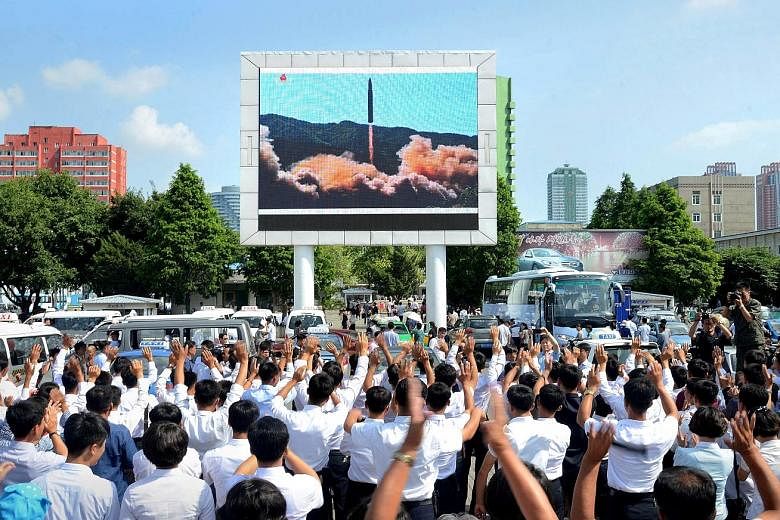China will likely assert greater pressure on North Korea to curb its nuclear and missile development programmes in order to prevent tension from escalating on the Korean peninsula, analysts say.
However, Beijing is unlikely to take the drastic measure of cutting oil and other energy supplies to Pyongyang because this is a last resort that it will not use lightly.
"China will go a step further to put pressure on North Korea," said security analyst Wang Xiangsui from Beihang University, on how Beijing would react to the latest missile test by North Korea.
Pyongyang on Tuesday launched an intercontinental ballistic missile (ICBM) that some analysts said could reach as far as Alaska, if reports of its range of roughly 6,700km are correct.
One key reason for China's likely move, said Professor Wang, is that it does not wish to see tension in the region escalate further.
Another is that North Korea has violated the United Nations Security Council resolutions against its nuclear and missile programmes. As China had supported these resolutions, it needs to take a position as a permanent member of the Security Council and as its current president, he said.
Prof Wang would not say what measures China might take against the North but noted that Beijing offers aid to its close ally, including oil.
However, security analyst Li Mingjiang from the S. Rajaratnam School of International Relations did not think that China would go as far as to cut oil and energy supplies to North Korea right now.
"Doing that will be a last resort as it will create a lot more damage to China's relationship with North Korea than all the existing pressures and sanctions that it is employing against the North," said Associate Professor Li. Instead, it might reduce its trade and financial ties with the North, he said.
It is estimated that more than 90 per cent of North Korea's foreign trade is with China.
While the progress that Pyongyang has evidently made in developing an ICBM, as shown in Tuesday's test, does not pose a direct security threat to China, it has got Japan and South Korea nervous.
Japan's Mainichi Shimbun yesterday quoted an unnamed senior official as expressing concern over North Korea's missile development and saying that "it is progressing faster than we thought".
Some Japanese analysts are suggesting that such a development might make Japan's going nuclear more acceptable to the Japanese people, who, being the only people to have suffered nuclear attacks at the end of World War II, are opposed to nuclear weapons.
The United States held a missile exercise with South Korea yesterday and warned that the allies were prepared to go to war with the North.
Still, Prof Li said Chinese decision- makers probably still harboured hope that China's proposal of a suspension of provocative acts - missile and nuclear tests by Pyongyang and large-scale military exercises by Washington and Seoul - and a dual-track process could be acceptable to all the parties concerned.
The dual-track process refers to talks on denuclearisation at the same time as negotiation of a peace treaty between North Korea and the US and South Korea. The 1950-53 Korean War ended in an armistice, leaving Pyongyang insecure over a possible US attack.
The US has set as a pre-condition a commitment to a complete, verifiable and irreversible dismantling of the North's nuclear programme before it will agree to talks. But North Korea will not give up its nuclear arms unless it has guarantees that it will not be attacked by the US.
And while South Korean President Moon Jae In's detente policy is under pressure because of Tuesday's missile test, at the first lull in the North Korean missile launches, "the South Korean government will again start talking of the need for dialogue and reconciliation", said Professor Brian Myers, a North Korea expert from Dongseo University in Busan.
Thus, Prof Li added, if the US cannot make a decision on whether to use military means to stop North Korea's nuclear drive and if sanctions also do not work, it may have little option except "direct engagement, contact and even negotiation" with the North.
• Additional reporting by Walter Sim


